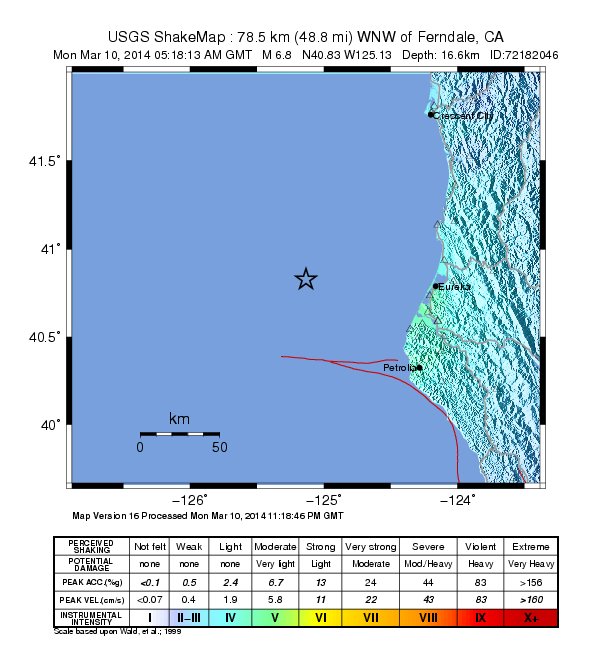Earth Watch Report - Earthquakes
Contributed by Northern California Seismic System, UC Berkeley and USGS Menlo Park
Instrumental Intensity

M 6.8 - 77km WNW of Ferndale, California
2014-03-10 05:18:13 UTC

Event Time
- 2014-03-10 05:18:13 UTC
- 2014-03-09 21:18:13 UTC-08:00 at epicenter
- 2014-03-10 00:18:13 UTC-05:00 system time
Location
40.829°N 125.134°W depth=16.6km (10.3mi)Nearby Cities
- 77km (48mi) WNW of Ferndale, California
- 81km (50mi) W of Eureka, California
- 85km (53mi) WNW of Fortuna, California
- 87km (54mi) W of McKinleyville, California
- 398km (247mi) NW of Sacramento, California
Tectonic Summary
The March 10, 2014 Mw6.9 earthquake off the coast of northern California occurred as the result of the oblique
strike slip motion on a fault approximately 80 km offshore of Eureka,
California. The preliminary location places the earthquake within the
Juan de Fuca plate (or Gorda subplate), which subducts beneath
northern California, Oregon, and Washington at a rate of ~23 mm/yr.
This location is outboard of the trench in the oceanic crust. The
earthquake was widely felt along the coast of northern California and southern Oregon, particularly in the city of Eureka.
The general tectonics of this region are characterized by
transitions between oceanic subduction of the Juan de Fuca plate beneath
the Pacific northwest region and the continuation of the San Andreas
Fault offshore. The intersection of the Juan de Fuca, North America, and
Pacific plates forms the Mendocino Triple Junction off the west coast
of California, with the subduction zone extending to the north and the
San Andreas Fault diverging to the west offshore and continuing to the
south. The offshore extension of the San Andreas Fault and southern
extent of the Juan de Fuca plate are defined by the easternmost exposure
of the Mendocino Fracture Zone. Several large earthquakes have occurred
in this region since 1900 within 100 km of the March 2014 event,
including events of M7.2 in 1922, M7.1 in 1923, M7.3 in
1980, M7.0 in 1994, M7.2 in 2005, as well as several events near the
coast or inland of California, including the 1992 M7.2 Petrolia
earthquake with its M6.6 and M6.4 aftershocks. Most recently,
an earthquake of M6.5 in January 2010 with a similar faulting mechanism
to the March 2014 event occurred.
.....
Depth, distance reduce impact of California quake
The magnitude-6.8 quake struck at 10:18 p.m. PDT Sunday and was centered 50 miles west of Eureka and about 10 miles beneath the Pacific seabed, according to the U.S. Geological Survey. It was initially reported as a magnitude-6.9, but later downgraded.
By late Monday morning, it had already produced 20 aftershocks of magnitude-3.5 or larger, and more were expected over the coming days, said Keith Knudsen, deputy director of the USGS's Earthquake Science Center in Menlo Park, Calif.
Knudsen said there was also a 5 to 10 percent chance of a larger quake in the area in the next week.
Sunday's quake was felt widely across the region, but both fire and sheriff's officials in Humboldt County said they had no reports of any damage or injuries. Humboldt County includes most of the populated areas closest to the epicenter.
Read More Here
.....
Earthquake Today: 6.9-Magnitude Quake Rattles N. California
By Associated Press | March 10, 2014
Last Updated: March 10, 2014 7:47 pm
The temblor struck at 10:18 p.m. PDT and was centered 50 miles west of Eureka and about four miles beneath the Pacific seabed, according to the U.S. Geological Survey. It was followed by about a half-dozen aftershocks, including one of magnitude 4.6.
There were no reports of any damages or injuries though the quake was felt widely and strongly, according sheriff’s and fire officials in Humboldt County, which includes most of the populated areas near the epicenter.
The National Tsunami Warning Center said there was no tsunami danger for the region.
Read More Here
.....
Northern California unscathed by 6.8 offshore quake
LOS ANGELES
(Reuters) - A series of small aftershocks continued to rattle the extreme northern coast of California on Monday, hours after a magnitude 6.8 earthquake shook the town of Eureka and an area extending into Oregon and Nevada with no reports of damage.
The main tremor, which struck at about 10:30 p.m. on Sunday, was centered in the Pacific about 50 miles west of Eureka and 10 miles beneath the ocean floor, according to the U.S. Geological Survey.
While earthquakes of that size can unleash widespread destruction if they score a direct hit on an urban area, as the 1994 Northridge quake did in Los Angeles, the impact of Sunday's tremor was largely buffered by its location out at sea, seismologists said.
Shaking from the quake was felt most strongly by residents in Eureka, a coastal community about 270 miles north of San Francisco, and the nearby town of Arcata, site of Humboldt State University, the USGS reported.
But no tsunami warnings were issued, and the morning watch commander for the Eureka police department, Sergeant Steve Watson, said there were no reports of injuries or damage to property in town.
Read More Here













No comments:
Post a Comment
Hello and thank you for visiting my blog. Please share your thoughts and leave a comment :)